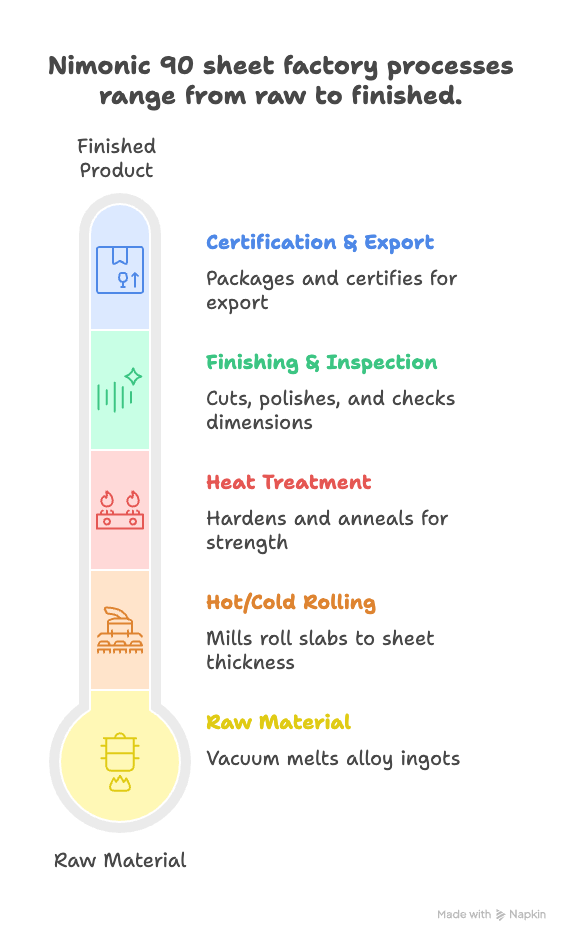A Nimonic 90 sheet factory specializes in the manufacture of high‐temperature nickel‐chromium-cobalt alloy sheets (grade Nimonic 90, also known as UNS N07090 / W. Nr. 2.4632) used in aerospace, power-generation, and other extreme‐environment applications. Such factories are equipped with specialized melting, rolling, heat-treating and finishing facilities to deliver sheets and plates with certified mechanical and chemical properties.

Key Features of a Nimonic 90 Sheet Factory
| Feature | Description |
|---|---|
| Raw material processing | Vacuum induction melting or vacuum arc remelting of Nimonic 90 alloy ingots to ensure low impurity levels. |
| Hot rolling / cold rolling lines | Large mills for hot‐rolled slabs, followed by cold rolling or finishing to sheet thickness as required. |
| Heat treatment & aging | Precipitation-hardening, annealing and other heat treatments to achieve the high temperature strength and creep resistance of Nimonic 90. |
| Finishing & inspection | Cut‐to‐size, polishing, pickling, surface finish checks, thickness tolerance measurement, certification. |
| Certification and export readiness | Mill test certificates (MTCs), compliance with ASTM/ASME/BS standards, export packaging logistics. |
Typical Specifications Produced by the Factory
| Specification | Typical Range |
|---|---|
| Thickness | 0.5 mm up to ~50 mm (depends on plate vs sheet) |
| Width / Length | Widths up to ~2000–3000 mm, lengths up to ~6000 mm or more |
| Finish | Hot-rolled, cold-rolled, annealed, pickled, polished |
| Standard grades | Nimonic 90 (UNS N07090 / 2.4632) as primary, includes equivalents |
| Mechanical properties | Tensile strength ~1100-1200 MPa, yield ~700-750 MPa, elongation ~30% (varies) |
Applications of Sheets from the Factory
| Industry | Applications |
|---|---|
| Aerospace | Turbine blades, engine exhaust components, hot‐section panels |
| Power Generation | Gas turbine casings, heat‐exchanger plates, high‐temperature boiler components |
| Chemical / Petrochemical | Reaction vessels, furnace linings, high‐temperature structural parts |
| Automotive & Motorsport | High‐performance exhaust systems, turbocharger components |
What to Check When Choosing a Factory
| Criterion | Why It Matters |
|---|---|
| Heat-number traceability | Ensures each sheet’s origin and process history is documented for high‐temperature reliability. |
| Standard compliance | Factories should comply with standards such as BS HR202, AECMA PrEN 2298, ASTM/ASME equivalents. |
| Quality testing | Non‐destructive testing, microstructure inspection, mechanical tests ensure performance. |
| Cut‐to‐size capability | Allows customer-specific dimensions and reduces waste. |
| Export packaging and logistics | Proper packaging prevents corrosion during sea/air freight; experienced logistics reduce delays. |
Frequently Asked Questions
Q1: What is the typical thickness range for Nimonic 90 sheets from a factory?
Commonly from about 0.5 mm up to around 50 mm, depending on whether sheet or plate form.
Q2: Can a Nimonic 90 sheet factory provide custom finishes?
Yes — factories often offer finishes like hot‐rolled, cold‐rolled, annealed, pickled or polished, and can supply custom sizes.
Q3: Which industries most rely on Nimonic 90 sheets?
Industries such as aerospace (turbine blades/exhaust parts), power generation (gas turbines/boilers), chemical processing and high‐performance automotive use these sheets extensively.



